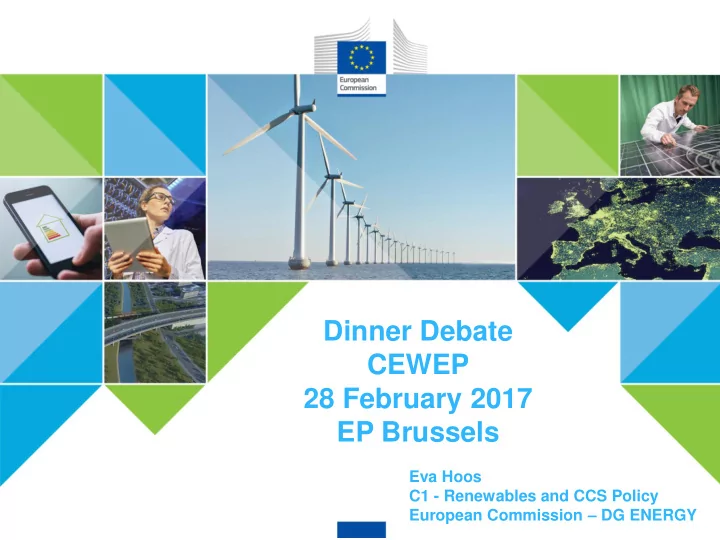

CLEAN ENERGY FOR ALL EUROPEANS Dinner Debate CEWEP 28 February 2017 EP Brussels Eva Hoos C1 - Renewables and CCS Policy European Commission – DG ENERGY 1 #EnergyUnion
CLEAN ENERGY FOR ALL EUROPEANS Waste-to-Energy: Key principles Residual non-recycable waste can be a source of primary energy saving and renewable energy if used for highly efficient energy recovery through: High-efficiency cogeneration (and trigeneration) Efficient district heating & cooling networks Waste reprocessing into solid, liquid & gaseous fuels that can be used through e.g. high-efficiency cogeneration, heat pumps and other advanced high efficiency technologies to produce heat/cold & power 2 #EnergyUnion
CLEAN ENERGY FOR ALL EUROPEANS Final energy consumption for heating and cooling (2012) TOTAL: 547.6 Mtoe – all sectors Coal 1,7 7,0 0,0 0,1 Fuel oil 0,3 Waste non-RES: 46,5 Natural gas 2.6 Mtoe or 61,9 2,6 0.5% Other fossil fuels 63,6 Electricity Waste RES: 0.3 40,3 Mtoe or 0.1% District heating Waste non.res. District Heat: 40.3 Mtoe or Waste RES 69,3 7.4% Biomass Out of which Geothermal Non-RES waste: 20,4 4% Solar energy 233,9 RES Waste: Ambient heat TOTAL 3.1% Other RES Source: Mapping and analyses of the current and future (2020 - 2030) heating/cooling fuel deployment (fossil/renewables), N°ENER/C2/2014-641 3 #EnergyUnion
CLEAN ENERGY FOR ALL EUROPEANS Key principles supported in the Energy Efficiency Directive and the Renewable Energy Directive I&II Energy Efficiency Directive : • Renewable Energy Directive: C omprehensive Assessment of Planning, building, renovating HE CHP and EDHC potentials urban, industrial and residential based on CBA methodology areas and energy (Art. 14, Annex VIII, IX) infrastructures, i.e. electricity, DHC, gas, alternatives (Art.15) Mapping of potential heating & cooling supply points, incl. RES H&C increase endeavour waste incineration plants requirement of 1 ppt/year (Art. 23) Integrated approach, national, regional and local geographies District heating, cooling (Art. 24) If economic potential, MS must take measures to develop it RES waste, advanced biofuels and waste based fuels
CLEAN ENERGY FOR ALL EUROPEANS Key principles applicable for waste-to-energy Clean Energy Package, Energy Union, Energy Efficiency Directive, Renewable Energy Directive (RED I and RED II) Efficient district heating and cooling is an enabler of renewable energy and energy efficiency and a tool to mainstream renewables and energy efficiency in heating and cooling Waste-to-energy : To be connected to district heating and cooling network To use high-efficiency cogeneration and other efficient technologies To be developed within an integrated energy approach, including at local and regional levels, which aims to: Utilise local renewable and other sustainable energy resources Optimising the use of local energy and other resources Primary energy savings and GHG reductions Supply security and stable competitive energy prices Local jobs Empowerment of consumers Energy communities 5 #EnergyUnion
CLEAN ENERGY FOR ALL EUROPEANS THANK YOU! Eva Hoos Eva.Hoos@ec.europa.eu 6 6 #EnergyUnion
Recommend
More recommend